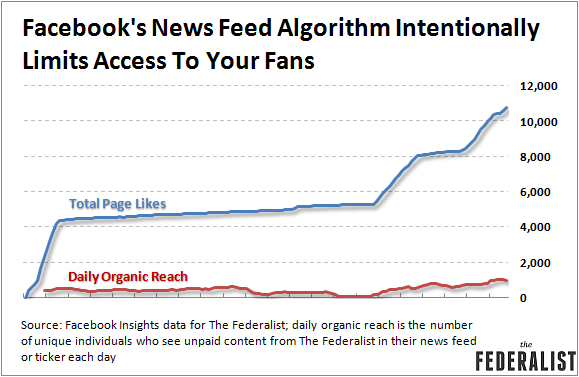Algorithmic gatekeeping is not mandated by any government agency, but it is probably silently encouraged. It allows information agencies to access information in a concise and efficient means, and more so, it enables FaceBook to bill advertisers top-dollar for “Suggested Posts.” FaceBook has become, now more than ever, a comprehensive and interactive advertisement, and this is becoming increasingly problematic for people who run “Pages” for their companies, magazines or zines, products, or services.
As one user pointed out, FaceBook’s algorithm becomes an obstacle for the admins of “Pages” because it filters out the content unless users are actively engaging with it. On a long enough timeline and with a small enough budget, a successful “Page” could grow stagnant. When this happens, FaceBook will prompt the admin to extend its reach – or it’s Internet influence – by purchasing an advertisement. This presents a slippery slope due to the fact that money is spent to gain “Likes,” but the users who “Like” the page will seldom see the content posted by the Page in the first place. Admins also have the option to “Boost” a post, and depending the amount of subscribers a Page has, the price can range from $7 and up per post. In the link above, Clifton claims that to boost a post, she would’ve had to pay $150 for a single post to reach up to 76,000 users.
Conversely, other users describe their success with boosting their posts and the revenue it generated shortly after, but it’s hard to imagine that as being sustainable for “Pages” that have hundreds of thousands of subscribers. Beyond the business perspective, your average user suffers because they will not always wake up the following day liking the same things. That is the major flaw in the algorithm present on FaceBook today.
Fixing the problem, however, is an entirely different issue. FaceBook is a business, and like any other business, it seeks to consistently make a profit year over year. Making FaceBook capitalistic in nature is not necessarily a negative concept, but successful Pages that existed (before the surge in usage by business) must ultimately pay more to stay relevant. FaceBook’s algorithm clearly rewards the purchase of ads, and there is nothing inherently wrong with that practice. The problem arises when FaceBook doesn’t clearly address how the money spent affects the bottom line because the algorithm is not transparent to business, or even the average user, leaving advertisers blindly dumping their budget into ineffective ads that could be spent elsewhere with an overall better reach.

Taken from The Federalist.